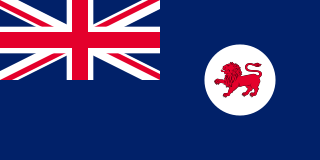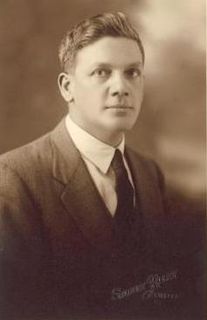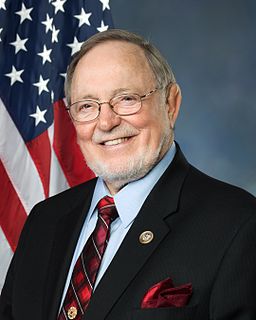This article needs additional citations for verification .(August 2010) (Learn how and when to remove this template message) |
In Australian parliamentary practice, the Father of the Australian Parliament is the more senior of the Father of the Senate and the Father of the House of Representatives. It is an informal, honorific title which carries no parliamentary responsibilities. Where two or more parliamentarians have had equal lengths of continuous service, more than any other currently serving parliamentarian, they are known as the joint Fathers of the Parliament. The current Father of the Parliament is Senator Ian Macdonald who has held the title since 10 May 2016.

Australia, officially the Commonwealth of Australia, is a sovereign country comprising the mainland of the Australian continent, the island of Tasmania and numerous smaller islands. It is the largest country in Oceania and the world's sixth-largest country by total area. The neighbouring countries are Papua New Guinea, Indonesia and East Timor to the north; the Solomon Islands and Vanuatu to the north-east; and New Zealand to the south-east. The population of 25 million is highly urbanised and heavily concentrated on the eastern seaboard. Australia's capital is Canberra, and its largest city is Sydney. The country's other major metropolitan areas are Melbourne, Brisbane, Perth and Adelaide.

The Parliament of Australia is the legislative branch of the government of Australia. It consists of three elements: the Crown, the Senate and the House of Representatives. The combination of two elected chambers, in which the members of the Senate represent the states and territories while the members of the House represent electoral divisions according to population, is modelled on the United States Congress. Through both chambers, however, there is a fused executive, drawn from the Westminster system.
Contents
The only Father of the Parliament with broken service but whose latter period of continuous service was sufficiently long to qualify was Eddie Ward.

Edward John Ward, Australian politician, was an Australian Labor Party member of the Australian House of Representatives from 1931 until his death, excepting a short six-and-a-half week break from December 1931 to February 1932.
The first parliament was elected in March 1901. The election was held on Friday 29 March in South Australia and Tasmania, and on Saturday 30 March in the other states. Despite that slight variation in the election date, all of those elected to the first Parliament were considered to have had equal seniority. It follows that there could not be a "longest-serving parliamentarian" until only one member or Senator from the first Parliament was still serving. That occurred on 30 June 1938 with the retirement of Senator Sir George Pearce, leaving Billy Hughes as the first Father of the Parliament.

South Australia is a state in the southern central part of Australia. It covers some of the most arid parts of the country. With a total land area of 983,482 square kilometres (379,725 sq mi), it is the fourth-largest of Australia's states and territories by area, and fifth largest by population. It has a total of 1.7 million people, and its population is the second most highly centralised in Australia, after Western Australia, with more than 77 percent of South Australians living in the capital, Adelaide, or its environs. Other population centres in the state are relatively small; Mount Gambier, the second largest centre, has a population of 28,684.

Tasmania is an island state of Australia. It is located 240 km (150 mi) to the south of the Australian mainland, separated by Bass Strait. The state encompasses the main island of Tasmania, the 26th-largest island in the world, and the surrounding 334 islands. The state has a population of around 526,700 as of March 2018. Just over forty percent of the population resides in the Greater Hobart precinct, which forms the metropolitan area of the state capital and largest city, Hobart.
The longest serving Father of the Parliament was Philip Ruddock MP who held the title from 1 September 1998 until his retirement from the House on 9 May 2016; a total of 17 years and 251 days. In late December 2012, he surpassed the previous record-holder, the inaugural Father Billy Hughes, who held the title for 14 years, 4 months (from 1 July 1938 until his death on 28 October 1952).

Philip Maxwell Ruddock is an Australian politician who is currently mayor of Hornsby Shire. He previously was a Liberal member of the House of Representatives from 1973 to 2016. First elected in a 1973 by-election, by the time of his retirement he was the last parliamentary survivor of the Whitlam and Fraser Governments. He was both the Father of the House and the Father of the Parliament from 1998 to his retirement. He is the second longest-serving parliamentarian in the history of the Australian Parliament. Ruddock served continuously in federal cabinet during the Howard Government, as Minister for Immigration and Multicultural Affairs from 1996 to 2003, and then Attorney-General from 2003 to 2007. He is also the Vice Chair of the Global Panel Foundation Australasia - with Sir Donald Charles McKinnon as Chair.

William Morris Hughes, was an Australian politician who served as the seventh Prime Minister of Australia, in office from 1915 to 1923. He is best known for leading the country during World War I, but his influence on national politics spanned several decades. Hughes was a member of federal parliament from Federation in 1901 until his death, the only person to have served for more than 50 years. He represented six political parties during his career, leading five, outlasting four, and being expelled from three.
Senator Macdonald is only the third Senator to hold the title with Senators Gordon Brown (1963–65) and Justin O'Byrne (1977–81) being the other two.

Gordon Brown was a long-serving Australian politician.

Justin Hilary O'Byrne, AO was a long-serving Australian Labor Party politician who represented Tasmania in the Federal Senate from 1947 to 1981, and was President of the Senate from 1974 to 1975.
| From | To | Father of the Parliament | Father of the Senate | Continuous term started | Father of the House of Representatives | Continuous term started |
|---|---|---|---|---|---|---|
| 29/30 March 1901 | 14 September 1923 | Nil | Nil | n/a | Nil | n/a |
| 15 September 1923 | 8 April 1935 | Nil | Sir George Pearce | 29 March 1901 | Nil | n/a |
| 9 April 1935 | 30 June 1938 | Nil [1] | Billy Hughes | 30 March 1901 | ||
| 1 July 1938 | 30 June 1947 | Billy Hughes MP | Thomas Crawford Harry Foll | 1 July 1917 | ||
| 1 July 1947 | 30 June 1950 | Gordon Brown Joe Collings | 1 July 1932 | |||
| 1 July 1950 | 28 October 1952 | Gordon Brown | ||||
| 29 October 1952 | 9 December 1961 | Sir Earle Page MP | Sir Earle Page | 13 December 1919 | ||
| 10 December 1961 | 31 July 1963 | Eddie Ward MP | Eddie Ward | 6 February 1932 | ||
| 1 August 1963 | 30 June 1965 | Senator Gordon Brown | Joe Clark John McEwen Sir Robert Menzies | 15 September 1934 | ||
| 1 July 1965 | 16 February 1966 | Joe Clark MP John McEwen MP Sir Robert Menzies MP | Sir Walter Cooper | 1 July 1935 | ||
| 17 February 1966 | 30 June 1968 | Joe Clark MP John McEwen MP | Joe Clark John McEwen | |||
| 1 July 1968 | 29 September 1969 | Bert Hendrickson Justin O'Byrne Dame Annabelle Rankin | 1 July 1947 | |||
| 30 September 1969 | 1 February 1971 | John McEwen MP | John McEwen | |||
| 2 February 1971 | 24 May 1971 | Arthur Calwell MP | Arthur Calwell | 21 September 1940 | ||
| 25 May 1971 | 30 June 1971 | Bert Hendrickson Justin O'Byrne | ||||
| 1 July 1971 | 2 November 1972 | Justin O'Byrne | ||||
| 3 November 1972 | 11 November 1975 | Fred Daly MP | Fred Daly | 21 August 1943 | ||
| 12 November 1975 | 10 November 1977 | Kim Beazley sr. MP | Kim Beazley sr. | 18 August 1945 | ||
| 11 November 1977 | 19 September 1980 | Senator Justin O'Byrne | Clyde Cameron Sir William McMahon | 10 December 1949 | ||
| 20 September 1980 | 30 June 1981 | Sir William McMahon | ||||
| 1 July 1981 | 4 January 1982 | Sir William McMahon MP | Doug McClelland | 1 July 1962 | ||
| 5 January 1982 | 31 March 1983 | Malcolm Fraser MP Sir James Killen MP Sir Billy Snedden MP | Malcolm Fraser Sir James Killen Sir Billy Snedden | 10 December 1955 | ||
| 1 April 1983 | 21 April 1983 | Sir James Killen MP Sir Billy Snedden MP | Sir James Killen Sir Billy Snedden | |||
| 22 April 1983 | 15 August 1983 | Sir James Killen MP | Sir James Killen | |||
| 16 August 1983 | 18 January 1984 | Doug Anthony MP | Doug Anthony | 14 September 1957 | ||
| 19 January 1984 | 23 January 1987 | Tom Uren MP | Tom Uren | 22 November 1958 | ||
| 24 January 1987 | 27 February 1989 | Arthur Gietzelt Peter Durack | 1 July 1971 | |||
| 28 February 1989 | 19 February 1990 | Peter Durack | ||||
| 20 February 1990 | 30 June 1993 | Ian Sinclair MP | Ian Sinclair | 30 November 1963 | ||
| 1 July 1993 | 31 August 1998 | Mal Colston Brian Harradine | 13 December 1975 | |||
| 1 September 1998 | 30 June 1999 | Philip Ruddock MP | Philip Ruddock | 22 September 1973 | ||
| 1 July 1999 | 30 June 2005 | Brian Harradine | ||||
| 1 July 2005 | 30 June 2008 | John Watson | 1 July 1978 | |||
| 1 July 2008 | 30 June 2014 | Ron Boswell | 5 March 1983 | |||
| 1 July 2014 | 6 February 2015 | John Faulkner | 4 April 1989 | |||
| 6 February 2015 | 9 May 2016 | Ian Macdonald | 1 July 1990 | |||
| 10 May 2016 | Incumbent | Senator Ian Macdonald | Kevin Andrews | 11 May 1991 |






